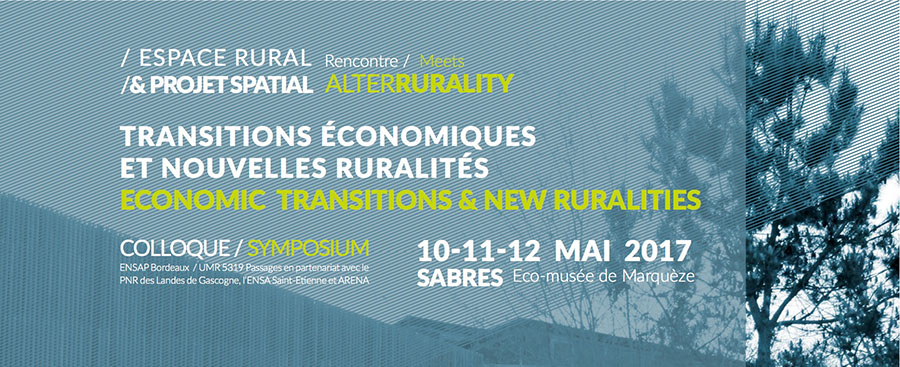TopicThinking the "chains of transitions "This symposium aims to question the consequences of this economic path within the context of rural territories and its emerging living practices, and to explore its implications for public policy and professional practices. The point of departure is the observation that rural space is a privileged space for emerging new economies.
Key questions which could be developed are:
Today, these questions echo the debate on the various forms of "transition" (Chabot, 2016) which currently occur in contemporary society. In this case, it is the issue of economic transition” that will be tackled in relation with a "chain of transitions" which today transforms the overall base of space design.
Imagining a new "economic narrative" in the age of energy transitionSince the 1980s, the growth of globalization and “financialization” have increased the power of neoliberal logics and largely contributed to the transformation of urbanization processes towards “metropolisation”. One of the consequences of this logic at the territorial scale is the decrease of the economic vitality of the numerous settlements – small towns and villages - which were not geographically connected to the flows of “metropolisation”. Regarding this issue, one of the main challenges of our time is to curb this huge “expropriation process” which occurred at the territorial scale, in order to rethink the geographical and economic dialectic which yesterday commanded the relation between city and territory. In short, the goal is to show how rural areas and territorial pattern/connection could initiate another type of economic regime/ system, another way of dwelling in the context of “metropolisation”. The energy transition is another key lever to approach economic transition in terms of dwelling in relation to the territory. Questioning and changing our economic system means reconsidering the evolution of the energy model on which contemporary communities live. As Agnès Sinaï (2015) explains, we cannot separate the process of economic growth from “its” physical and energy substrate. The field of the bio-economy, developed by pioneer works of Nicholas Georgescu-Roegen (1979) and René Passet (1979 ) helps to introduce this link. The bio-economy notion is based on two principles revealing the link between communities, settlements and their economic activities:
Instead of territorial competition pattern based on growth and overproduction, the notion of bio-economy constitutes an opening towards other “economic software” conferring rural territories another role, another status. This notion goes against neoliberal systems of production and consumption by exploring a set of proposals from social and solidarity economy and by contributing to a plural economy (Ndiaye, 2011). At another level, this challenge of the economic transition is an opportunity to imagine a new “economic narrative”, as Eloi Laurent (2016) suggests. Regarding work engaged by ERPS and Alter-rurality networks, this conference will give an opportunity to review several notions: solidarity and territorial equity (Sery and Saunier, 2016), "city / countryside pact" (Guillot, 2011), identification of an "alter-rurality", as mentioned by Pieter Versteegh and Chris Younes (2012). |


